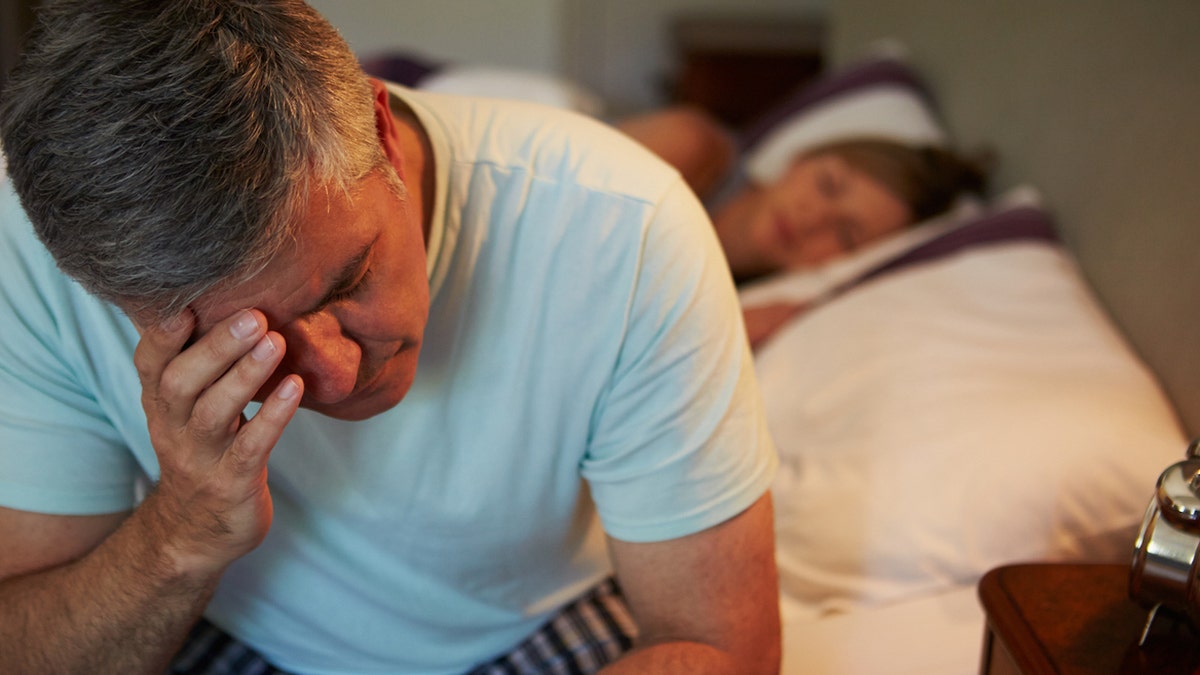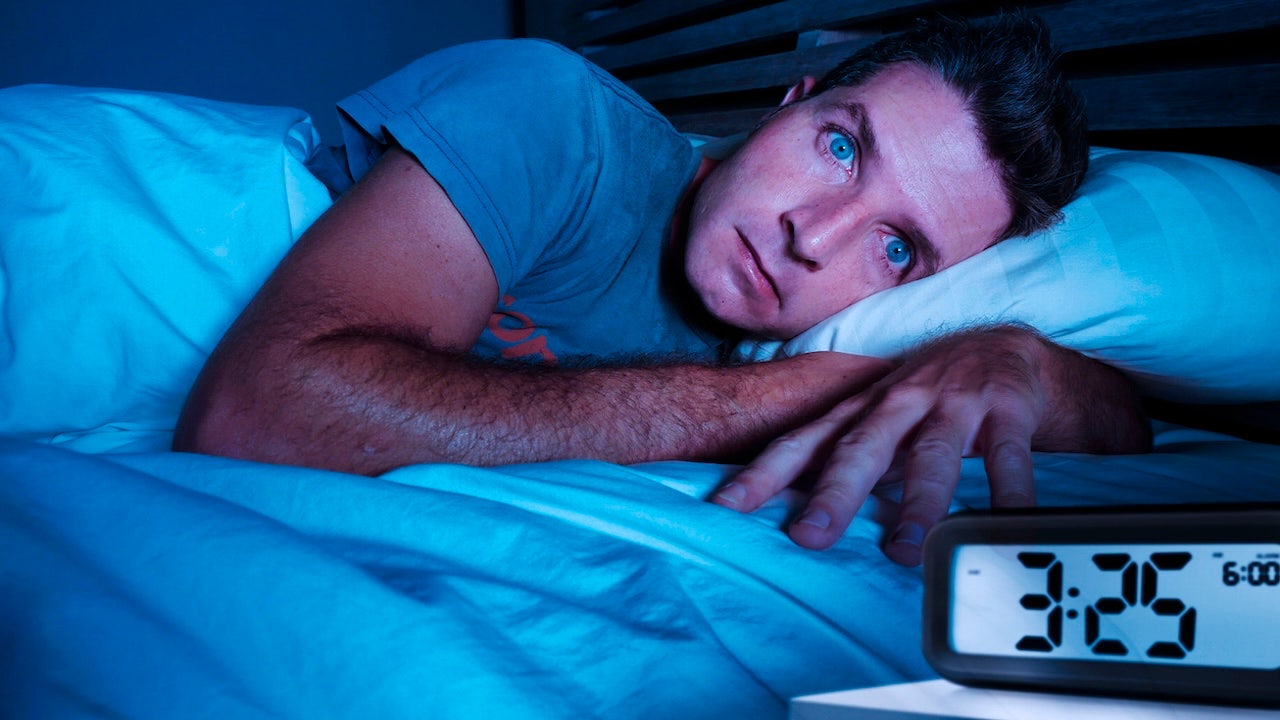This story discusses suicide. If you or someone you know is having thoughts of suicide, please contact the Suicide & Crisis Lifeline at 988 or 1-800-273-TALK (8255).
We’ve all experienced the irritability that comes with a lack of shuteye — but an extended period of poor sleep health could lead to far more serious effects than that.
Some experts warn that people who have chronic sleep struggles are more likely to experience suicidal ideations.
SUICIDE WARNING SIGNS ARE MISSED BY MOST AMERICANS, NEW SURVEY FINDS: IT’S ‘ALARMING’
Fox News Digital spoke with Taft Parsons III, M.D., vice president and chief psychiatric officer at CVS Health in Birmingham, Michigan, about this concerning link.
‘No single cause’
Research shows that 42% of Americans have shared concerns about their mental health, and 18% say they were plagued with suicidal thoughts at some point during this past year, according to Parsons.
Suicide is very complex with several intersecting risk factors, he noted.
Some experts warn that people who have chronic sleep struggles are more likely to experience suicidal ideations. (iStock)
“There is no single cause of suicide — it is a convergence of health factors, along with other psychosocial and environmental variables that can increase the chances someone may take their own life,” he told Fox News Digital.
These can include social and environmental factors, such as prolonged stress and legal and financial issues, he noted.
SUICIDE RATES REACH ALL-TIME HIGH IN US, PER CDC DATA
Past trauma and psychological health issues — like depression, substance use disorder and sleep — can also be factors.
“Some of these factors can be more challenging than others to address, but seeking help for sleep issues or disorders can be a step toward addressing one potential risk factor,” said Parsons.
Why do sleep issues increase the risk?
Inadequate sleep can negatively impact critical functions like decision-making, impulse control, problem-solving abilities, emotion regulation and resilience, Parsons noted.
“When a person is struggling with sleep deprivation, it can increase various adverse health outcomes, including heart disease and type 2 diabetes,” he said.

Inadequate sleep can negatively impact critical functions like decision-making, impulse control, problem-solving abilities, emotion regulation and resilience, an expert said. (iStock)
“It can also lead to increased depression and anxiety, both of which can play a significant role in suicide.”
Well-rested people are better equipped to face life’s challenges, effectively manage stress and maintain a positive mindset, according to the expert.
“Improved sleep can also reduce impulsivity and emotional dysregulation, both of which can be associated with suicidality,” he said.
Signs of sleep-induced suicidal tendencies
People who have suicidal ideations will often exhibit sudden changes in behavior, said Parsons.
Those can include new sleep issues such as insomnia or sleeping too much.
IMPROVE YOUR SLEEP BY OPTIMIZING 6 BIOMARKERS: ‘INTEGRAL TO HEALTH’
“Similarly, we view withdrawal from friends and family, reckless actions or increased use of substances as warning signs,” he told Fox News Digital.
“So, focusing on the sudden or uncharacteristic change in sleep is the critical factor, not necessarily the number of nights.”

People who have suicidal ideations will often exhibit sudden changes in behavior, said one expert. Those can include new sleep issues such as insomnia or sleeping too much. (iStock)
Recognizing common signs of sleep deficiency is crucial to stopping it from interfering with a person’s mental health, according to Parsons.
When people are sleep-deprived, they will often experience problems with concentration, memory, decision-making, problem-solving, and regulation of emotions and behavior, he pointed out.
“Focusing on the sudden or uncharacteristic change in sleep is the critical factor.”
“Individuals who are not well-rested, and may also have difficulty regulating their emotions, are at increased risk of poor decision-making and have a negative ability to cope effectively when faced with overwhelming stresses,” Parsons warned.
“If these problems come on suddenly, escalate or become recurring, they may indicate more serious or underlying issues and indicate a mental health issue.”
Experts recommend that adults get between seven and nine hours of sleep per night.

“Individuals who are not well-rested, and may also have difficulty regulating their emotions, are at increased risk of poor decision-making and have a negative ability to cope effectively when faced with overwhelming stresses.” (iStock)
Children and teens generally need more sleep than adults.
When to seek support
For those struggling with sleep challenges, experts recommend seeking treatment when they’re not able to manage the issue themselves.
“Many people unwittingly have habits that are detrimental to a good night’s sleep, and thus should start with a sleep hygiene program for several weeks,” Parsons suggested.
SLEEP DEPRIVATION DANGERS: HOW PULLING AN ALL-NIGHTER AFFECTS YOUR PHYSICAL AND MENTAL HEALTH
“If you notice someone is displaying warning signs of suicide, including sudden sleep issues, or other signs including mood changes or verbal cues, it is important to reach out, have an honest conversation, express concern, and help connect them to support,” he said.
“There are resources available to help prioritize well-being, no matter where on the spectrum of mental health someone may fall.”
Even if suicide turns out to not be a concern, the person may still feel comforted, supported and relieved by someone taking the time to connect and listen, Parsons noted.
CLICK HERE TO SIGN UP FOR OUR HEALTH NEWSLETTER
It’s not necessary for people to wait until they’re in crisis to reach out for support, he emphasized.
“There are resources available to help prioritize well-being, no matter where on the spectrum of mental health someone may fall,” he said.
CLICK HERE TO GET THE FOX NEWS APP
“The earlier someone connects to support and resources, the sooner they can feel better and increase their overall resilience.”
If someone is exhibiting signs of suicide ideation, it is crucial the person gets help immediately by calling or texting 988 to reach the 988 Suicide and Crisis Lifeline.





